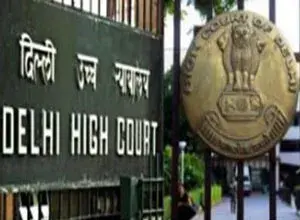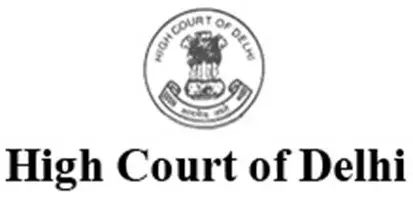Delhi High Court suspends functioning till August 14, 2020.
 The Administrative and General Supervision Committee of the Delhi High Court vide its Office Order dated July 30, 2020 has further extended the suspended functioning of Delhi High Court till August 14, 2020
The Administrative and General Supervision Committee of the Delhi High Court vide its Office Order dated July 30, 2020 has further extended the suspended functioning of Delhi High Court till August 14, 2020
Consumer Protection Act, 2019 comes into force.
 The Central Government vide its notification dated July 15, 2020 brought into force certain set of provisions under the Consumer Protection Act, 2019 which would become effective from July 20, 2020.
The Central Government vide its notification dated July 15, 2020 brought into force certain set of provisions under the Consumer Protection Act, 2019 which would become effective from July 20, 2020.
Consumer Protection (E- Commerce) Rules, 2020 comes into force.
 To protect the consumers from unfair trade practices and to address their concerns, the Ministry of Consumer Affairs, Food and Public Distribution on July 23, 2020 notified the Consumer Protection (E-Commerce) Rules, 2020
To protect the consumers from unfair trade practices and to address their concerns, the Ministry of Consumer Affairs, Food and Public Distribution on July 23, 2020 notified the Consumer Protection (E-Commerce) Rules, 2020
WIPO’s New Data Agreement: Extensive Reach for CMOs Repertoire.
 World Intellectual Property Organization (WIPO) on July 30, 2020 has announced a new agreement for additional cooperation by the WIPO with the International Confederation of Societies of Authors and Composers (CISAC), in line with the WIPO Connect program
World Intellectual Property Organization (WIPO) on July 30, 2020 has announced a new agreement for additional cooperation by the WIPO with the International Confederation of Societies of Authors and Composers (CISAC), in line with the WIPO Connect program
India: Kashmir Saffron gets the GI Tag.
 Kashmir which is also called ‘Paradise on Earth’ is celebrated for a ton of things including its scenic beauty, plentiful wildlife, local handicrafts, local food and one of the significant things which gets Kashmir
Kashmir which is also called ‘Paradise on Earth’ is celebrated for a ton of things including its scenic beauty, plentiful wildlife, local handicrafts, local food and one of the significant things which gets Kashmir
Delhi High Court restrains website from allocating unauthorized barcodes.
 The Plaintiff, GS1 India, is a society registered under the Societies Registration Act set up in 1996 by several industry bodies and statutory bodies like Bureau of Indian Standards (BIS), Federation of Indian Chambers of Commerce and Industry (FICCI), Associated Chambers of Commerce and Industry of India (ASSOCHAM) and Confederation of Indian Industry (CII).
The Plaintiff, GS1 India, is a society registered under the Societies Registration Act set up in 1996 by several industry bodies and statutory bodies like Bureau of Indian Standards (BIS), Federation of Indian Chambers of Commerce and Industry (FICCI), Associated Chambers of Commerce and Industry of India (ASSOCHAM) and Confederation of Indian Industry (CII).
Delhi High Court suspends functioning till August 14, 2020

The Administrative and General Supervision Committee of the Delhi High Court vide its Office Order dated July 30, 2020 has further extended the suspended functioning of Delhi High Court till August 14, 2020 in the wake of the COVID-19 outbreak and subsequent spike witnessed of coronavirus cases in NCT of Delhi[1]. The suspension of High Court of Delhi is based on the terms as enumerated under the Resolution dated June 13, 2020[2].
The Office Order further notifies new date of hearing for all the matter listed before the Court from 04.08.2020 to 14.08.2020 as under:
| Date already fixed | New Date of Hearing |
| 04.08.2020 (Tuesday) | 28.09.2020 (Monday) |
| 05.08.2020 (Wednesday) | 29.09.2020 (Tuesday) |
| 06.08.2020 (Thursday) | 30.09.2020 (Wednesday) |
| 07.08.2020 (Friday) | 01.10.2020 (Thursday) |
| 10.08.2020 (Monday) | 05.10.2020 (Monday) |
| 11.08.2020 (Tuesday) | 06.10.2020 (Tuesday) |
| 13.08.2020 (Thursday) | 07.10.2020 (Wednesday) |
| 14.08.2020 (Friday) | 08.10.2020 (Thursday) |
The Office Order further notifies that:
- The Courts of Registrars and Joint Registrars of Delhi High Court will be hearing matters listed before them through video conferencing; and
- Evidence shall be recorded only in ex-parte and uncontested matters where the same is required to be tendered by way of affidavit
Also read:
Delhi High Court Allows Public Viewing of Court Proceedings
Delhi High Court Permits E-service of Summons and Documents
[1] http://delhihighcourt.nic.in/writereaddata/Upload/PublicNotices/PublicNotice_1KTW5SWXGT5.PDF
[2] http://delhihighcourt.nic.in/writereaddata/Upload/PublicNotices/PublicNotice_RX6JVN5F3DT.PDF
Consumer Protection Act, 2019 comes into force.

By Reetika Wadhwa and Nishtha Das
The Central Government vide its notification dated July 15, 2020 brought into force certain set of provisions under the Consumer Protection Act, 2019 which would become effective from July 20, 2020. Some of these provisions include protection and enforcement of consumer rights through Central Consumer Protection Authority, prevention of unfair trade practice by e-commerce platforms, punishment for sale of adulterated products, etc.[1]
Consumer Protection Act, 2019- Provisions
To elaborate further, the following provisions of the Act have been brought into force through the above notification:
- Section 2: This section covers the fundamental part of the Act i.e. the definitions of various terms. Various definitions including that of consumer, consumer rights, complaints, consumer disputes have now been brought into force. However, terms like direct selling ecommerce are yet to be formally affected.
- Section 3 to 9: These sections cover the object and procedure for various Consumer Councils established under the Act.
- Section 28 to 73: These sections talk about the entire legal framework, operational procedure, jurisdiction, etc. for the District Consumer Dispute Redressal Commission, and similarly the State Commission and National Commission.
- Section 74 to 81: These sections introduce the Consumer Mediation Cell and establishes the conduct to be followed for settlement of consumer disputes through Mediation.
- Section 82 to 87: These sections cover the term Product Liability and its implications. They establish a procedure where a consumer can bring out product liability action against the manufacturer of the product or the service provider. According to the Section 84 of the Act, a product manufacturer will be liable in the following circumstances:
- when the product contains a manufacturing defect;
- when the product is defective in design;
- when there is a deviation from manufacturing specifications;
- when the product does not conform to the express warranty;
- when the product fails to contain adequate instructions of correct usage to prevent any harm or any warning regarding improper or incorrect usage.
Interestingly, the product manufacturer shall also be held liable for product liability action even if he proves that he was not negligent or fraudulent in making the express warranty of a product.
Subsequently, Section 85 of the Act lays down the following circumstances where a service provider can be held liable:
- when the service provided by him was faulty or imperfect or deficient or inadequate in quality
- when there was an act of omission or commission or negligence or conscious withholding any information which caused harm;
- when the service provider did not issue adequate instructions or warnings to prevent any harm
- when the service did not conform to express warranty or the terms and conditions of the contract.
On the similar lines, product liability action has also been covered for a product seller apart from manufacturer and service provider. Therefore, with the enforcement of these sections, from now on, the product seller has also been brought under the purview of the Act.
- Section 90 and 91: These Sections provides for the provision of imprisonment and penalties in case of manufacturing for sale or storing, selling or distributing or importing products containing adulterant or spurious products.
- Section 95, 98, 100 and 101: Miscellaneous provisions like these have now been brought into force.
Also, as per media reports, the Ministry of Consumer Affairs has issued a statement clarifying the following points which will soon be enforced through a gazetted notification:[2]
Product recall
The Consumer Protection Council will be empowered to carry out investigations in respect of consumer rights violations and accordingly institute complaints in this regard. Further, the Council can order for prosecution or order for recall of unsafe goods and services in furtherance to the inspection or investigations carried out by the Council.
Liability for e-commerce entity
E-commerce entity shall be liable for mentioning such information including but not limited to country of origin, return, refund, exchange, warranty and guarantee, delivery and shipment, modes of payment, grievance redressal mechanism, payment methods, security of payment methods, charge-back options. Additionally, the e-commerce entities will be reuired to address a consumer complaint within 48 hours of receipt of complaint and resolve the issue in entirety within a month. However, the said requirements imposed on the e-commerce entity are yet to be officially notified through publication in gazette.
Celebrity endorsement
The Act would also bring endorsers under the garb of consumer protection laws and would prosecute endorsers for getting involved or engaging in a false or misleading advertisement. This would rightly propagate the phrase “with fame comes responsibility”. Recently, well known celebrities like Jackie Shroff and Govinda were held liable by a district consumer court for endorsing a misleading advertisement for a pain relief oil.
Place of complaint filing
The complainant shall now be able file a consumer complaint electronically. The place of residence for the complainant shall have the jurisdiction to try such complaint. The matter shall be heard through videoconfrencing and it shall be deemed admissible, if its admissibility is not decided within 21 days.
It is pertinent to mention that the above provisions will not only empower the consumers but will give them the needful opportunity for their complaints to be rightfully addressed within a condensed timeframe. Also, the responsibility for e-commerce entities has risen and their operational structure is going to be framed in a consumer oriented manner. Nevertheless, this would maintain the balance of quality products and would also help to boost the Indian economy after being strongly impacted by the COVID 19 pandemic wave.
[1] Notification – S.O. 2351(E)
Related Posts
Beneficiary is “consumer” under the Consumer Protection Act: SC
Ministry of Consumer Affairs Comes to the Aid of Retailers/Manufacturers
Consumer Protection (E- Commerce) Rules, 2020 comes into force

To protect the consumers from unfair trade practices and to address their concerns, the Ministry of Consumer Affairs, Food and Public Distribution on July 23, 2020 notified the Consumer Protection (E-Commerce) Rules, 2020. The E-commerce Rules have primarily been formulated with the objective to regulate the E-commerce sector in India and protect consumers from unfair trade practices on such platforms.
The Rules are applicable to all goods and services bought or sold over digital or electronic network including digital products; all models of e-commerce, including marketplace and inventory models of ecommerce; all e-commerce retail, including multi-channel single brand retailers and single brand retailers in single or multiple formats; and all forms of unfair trade practices across all models of E-commerce[1].
Also read Draft E-commerce Guidelines issued by the Ministry of Consumer Affairs
Key Highlights of the Consumer Protection (E-Commerce) Rules, 2020
A conspectus of some of the key provisions of the E-commerce Rules are enumerated as under:
- Duties of E-commerce entities
The E-commerce Rules specify certain duties which the E-commerce entities are required to abide by. The duties inter alia include the following–
- Every E-commerce entity shall provide the following information on its platform-
- legal name of the E-commerce entity;
- principal geographic address of its headquarters and all branches;
- name and details of its website; and
- contact details like e-mail address, fax, landline and mobile numbers of customer care as well as of grievance officer.
- Every E-commerce entity shall establish a grievance redressal mechanism and appoint a grievance officer for consumer grievance redressal, and display the name, contact details, and designation of such officer on its website. The grievance officer is required to acknowledge the receipt of consumer complaints within forty-eight hours and redresses the complaint within one month from the date of receipt of the complaint.
- While offering any imported goods and services to the consumers, an E-commerce entity must mention the name and details of the importer. (Also read: Country of Origin to be specified on E-commerce websites
- No E-commerce entity shall impose cancellation charges on consumers unnecessarily.
- An E-commerce entity cannot record the consent of the consumer to purchase any good or service automatically, it must be expressed through an explicit and affirmative action.
- Manipulation of the price of goods and services so as to gain unreasonable profit from consumers shall not be entertained.
- Liabilities of marketplace E-commerce entities
There are certain conditions which are expected to be fulfilled by marketplace E-commerce entities which inter alia include as under-
- A market place E-commerce entity must ensure that descriptions, images, and other content pertaining to goods or services on their platform is precise and relates directly with the appearance, nature, quality and other general features of such good or service.
- Every marketplace entity shall enable the consumers to make informed decisions by providing the following – details about the sellers offering goods and services, including the name of their business, whether registered or not, their geographic address, customer care number, any rating or other aggregated feedback about such seller; – ticket number for each complaint from which the consumer can track the status of complaint; – information relating to return, refund, exchange, warranty and guarantee, delivery and shipment, modes of payment, and grievance redressal mechanism; -information on all the available payment methods; – a description explaining the ranking of the goods in simple and intelligible manner.
- Every market place entity shall also include in its terms and conditions a description of any different treatment which it gives to goods or services or sellers of the same category, if any.
- Duties of sellers on marketplace
- No seller shall falsely present itself as a consumer and post fake reviews about the goods and services or about the features or qualities of those goods and services.
- No seller shall refuse to take back goods, or withdraw or discontinue services purchased or agreed to be purchased, or refuse to refund if the goods or services provided by the seller are defective or do not match the qualities or features mentioned by the seller on the website or if they are delivered later than the expected delivery date.
- Duties and liabilities of inventory e-commerce entities
Every inventory E-commerce entity shall provide the following information-
- Accurate information related to return, refund, exchange, warranty and guarantee, delivery and shipment, cost of return shipping, mode of payments, grievance redressal mechanism, all mandatory notices and information required by applicable laws, display single figure total along with the break-up price and ticket number for each complaint from which the consumer can track the status of complaint.
- If any inventory E-commerce entity vouches for the authenticity of goods or services sold by it then shall bear appropriate liability in any action related to the authenticity of such good or service.
The E-commerce sector has witnessed an unprecedented growth in the recent years, as people are relying on online shopping for almost everything today. Therefore, a set of uniform rules regulating E-commerce transactions and subsequent consumer issues is the need of the hour in order to ensure fair competition and consumer protection. Thus, the introduction of the Consumer Protection (E-Commerce) Rules, 2020 if implemented in true spirit will shield consumers from unfair trade practices to a great extent.
Also read:
E-commerce Websites now come under the purview of Legal Metrology Act, 2009
Curbing Online Counterfeiting in India
[1] https://consumeraffairs.nic.in/sites/default/files/e-commerce%20rules_Hindi_0.pdf
WIPO’s New Data Agreement: Extensive Reach for CMOs Repertoire.

By Shilpi Sharan and Meril Mathew Joy
World Intellectual Property Organization (WIPO) on July 30, 2020 has announced a new agreement for additional cooperation by the WIPO with the International Confederation of Societies of Authors and Composers (CISAC), in line with the WIPO Connect program.[1]
The Vision of New Data Agreement
The New Data Agreement aims to empower the Collective Management Organisations (CMOs) in developing countries with an opportunity to commercialize their repertoire internationally. CMOs, known as Copyright Societies in India, are organizations that manage and administer the copyrighted works of authors/ artists and owners pertaining to various fields, by licensing and assigning the works entrusted to them, as well as collect resulting royalties for the works in view of distributing the same amongst the owners and artists.
WIPO intends to facilitate the current agreement by utilizing the WIPO tool, i.e. WIPO Connect. WIPO Connect is a tool for managing data and repertoire, along with management and ease of licensing, assigning and any other commercial arrangements for the protected works. The current agreement would allow for the connection of the tool with International Confederation of Societies of Authors and Composers (CISAC)[2] international information exchange network in order to facilitate international reach for CMOs as well as sharing of their data and repertoire with other CMOs.
Benefits of the Agreement
| 1. | The CMOs or Societies will be able to extend the services provided by them through the use of the WIPO tool, i.e. the WIPO Connect Program. |
| 2. | The CMOs or Societies will be able to collect royalties from across borders, enhancing the commercial potential of a work. |
| 3. | The CMOs or Societies will have a centrally available platform to interact with other CMOs which will facilitate data sharing as well as ease of business amongst the societies |
The present new data agreement is in line with and in furtherance to the agreement between WIPO and SUISA[3] (Collecting Society for Swiss songwriters, composers and music publishers) for the obtaining access to a global system of information on authors, composers and publishers for easy identification.
The agreement is believed to create a more engaging and easy to access global exchange platform for CMOs as well as aid WIPO in facilitating better standards for commercial exploitation and reach for CMOs of developing countries in order to enhance their service providing capabilities.
This vision by the WIPO comes as an opportunity for the Copyright Societies in India which are:
- The Indian Performing Right Society Limited (IPRS) for Literary works associated with Musical Works.
- Indian Singers Rights Association (ISRA) for Performers (Singers) Rights
- Indian Reprographic Rights Organization (IRRO) for Reprographic (photocopying) works.
to become a part of the global repertoire system and help the authors, artists, composers and owners of copyrighted works to seek their fair share of royalties from any worldwide use of their work. With copyright industry growing at a very fast pace in India it is certainly looking forward to exclusive exploitation of work internationally.
[1] Available at https://www.wipo.int/pressroom/en/articles/2020/article_0015.html
[2] CISAC is the world’s leading network of authors’ societies which represents more than 4 million creators from all geographic areas and all artistic repertoires; music, audiovisual, drama, literature and visual arts.[2] CISAC enables the collective management Organisations to represent creators worldwide and help the flow of royalties to the authors for the use of their copyrighted works anywhere in the world (available at cisac.org/Who-We-Are )
[3] SUISA is the Cooperative Society of Music Authors and Publishers in Switzerland and Liechtenstein representing world music repertoire of 2 million authors in Switzerland and Liechtenstein and helps the authors in licensing their work to various customers including concert organizers, radio broadcasters, record companies as well as hotels etc.
Related Posts
WIPO PROOF – Digitally Signed Tamper-Proof Evidence
WIPO modifies time limits under PCT amid COVID-19
WIPO figures indicate need of green tech innovation surge to flight climate change
India: Kashmir Saffron gets the GI Tag.

Kashmir which is also called ‘Paradise on Earth’ is celebrated for a ton of things including its scenic beauty, plentiful wildlife, local handicrafts, local food and one of the significant things which gets Kashmir on the global map is its famous spice and health rejuvenator ‘Kashmir Saffron’, which has recently received the much-awaited Geographical Indication (GI) certification by the Geographical Indications Registry[1].
The application for registration of “Kashmir Saffron” as a GI was filed in respect of goods under class 30. Kashmiri Saffron is cultivated and harvested in Karewa (highlands) and is believed to have been introduced in Kashmir around 1st Century BCE by Central Asian immigrants. It is the only Saffron in the world which is grown at an altitude of 1,600 metres, thus making it exceptional and remarkable from the Saffron grown in the other parts of the world.[2]
What is Geographical Indication (GI)?
Geographical Indication is a name or sign given to certain products that relates or belongs to a specific geographical location or origins like a region, town or country. GI helps the genuine producers to earn profit in the competitive market and enables the customers to buy products having superior quality.
Read more about GI here.
As per Section 2(1)(e) of the Geographical Indications of Goods (Registration and Protection) Act, 1999 a geographical indication pertains to agricultural, natural or manufactured goods, which originate and are produced/processed in a specific geographical territory, thereby associating a reputation for such territory.[3]
Kashmiri Saffron has a rich cultural heritage and is very famous globally. It holds an immense importance in pharmaceuticals, cosmetics, perfumery and textile dye-producing industry. It is extensively used as a spice to add flavour to food and as a dye to colour foods. It has also been associated with Kashmiri food cuisine. It has also been reported that Pampore, which is the hub of Saffron in Kashmir is likely to have a bumper crop of the spice this season due to initiatives taken by the National Mission on Saffron (NMS). Under the NMS, a project of Rs 411 crore was approved by the Union government under which an area of 3,715 hectare for saffron was proposed to be rejuvenated.[4]
It is expected that this GI certification will help farmers in getting the best remunerative price also help in preventing the prevalent practice of adulteration of Saffron.
[1] http://ipindia.nic.in/writereaddata/Portal/Images/pdf/GI_Application_Register_10-09-2019.pdf
[2] In a historic first, Kashmir saffron gets GI certification; https://www.hindustantimes.com/india-news/in-a-historic-first-kashmir-saffron-gets-gi-certification/story-xhVq8sB8BnCkXHX5Vm7JzN.html; accessed on July 28, 2020
[3] Section 2(1)(e) of the Geographical Indications of Goods (Registration and Protection) Act, 1999; http://www.ipindia.nic.in/act-1999.htm accessed on July 28,2020
[4] Supra Note 2
Related Posts
INDIA: MANIPUR BLACK RICE ‘CHA-KHAO’ GETS GI TAG
India: Tamil Nadu earns two more GI tags- Dindigul Locks and Kandangi sarees
Delhi High Court restrains website from allocating unauthorized barcodes

The High Court of Delhi in a recent order passed in the case of GS1 India v Barcodes SL & Ors., restrained the websites www.indiabarcodeshop.com and www.india-barcodes-store.com from infringing the Plaintiff’s registered certification mark.
Brief Background
The Plaintiff, GS1 India, is a society registered under the Societies Registration Act set up in 1996 by several industry bodies and statutory bodies like Bureau of Indian Standards (BIS), Federation of Indian Chambers of Commerce and Industry (FICCI), Associated Chambers of Commerce and Industry of India (ASSOCHAM) and Confederation of Indian Industry (CII). The Plaintiff holds a license from the global body namely GS1 which was set up by various countries coming together to maintain global standards as also database of the barcodes issued in compliance with the standard set up by GS1, the global body. The Plaintiff has been allocated the code ‘890’ which is further allocated along with ten other digits to various manufacturers, suppliers who want their products to be certified with a barcode to ascertain the country of origin as also the manufacturing, supplying units of the product. Once the Plaintiff allocates the bar code, the same is entered into the database of the global page of GS1 thereby giving it a uniqueness and also ensuring uniformity in the standards. The Plaintiff also has a certificate of registration for a trademark with a pictorial design and ‘890’ therein in class 35 for the business of certification.
Defendant no. 1, Barcodes SL, is the operator of two websites namely www.indiabarcodeshop.com and www.india-barcodes-store.com, through which it allocates barcode numbers starting with ‘890’. The Defendant nos. 2 and 3 are the domain registrars of the websites of the Defendant no. 1. The Defendant nos. 4 and 5 are the Department of Telecommunications and Ministry of Electronics and Information Technology. The Plaintiff also filed an interim application seeking leave of the Hon’ble Court to institute the suit without serving notice to the Defendant nos. 4 and 5, as mandated under Section 80 of Code of Civil Procedure, due to the urgent nature of the suit, which was allowed.
Plaintiff’s contentions and submissions
- It is the case of the Plaintiff that the Defendant no. 1 through its website is allocating barcode numbers starting with the numbers ‘890’ and such barcode by the Defendant no. 1 do not originate from the Plaintiff and are not compliant with the GS1 standards. Furthermore, such barcodes are not unique and cannot be verified against the GS1 global database.
- That the Defendant no. 1’s activities amount to infringement of the Plaintiff’s trademark in addition to being a violation of the common law rights of the Plaintiff, causing deception to the customers and public at large.
- The Plaintiff further placed on record complaints by customers of Defendant no. 1 who have been cheated by issuing fake and illegal bar codes starting with number ‘890’ to show that they have been validly issued by the Plaintiff.
Court’s Observation and Directions
The Hon’ble Ms. Justice Mukta Gupta, after considering the materials placed on record, was of the view that the Plaintiff has made out a prima facie case in its favor and irreparable loss would be suffered by not only the Plaintiff but other innocent customers as well. Therefore, an ad-interim injunction was granted in favour of the Plaintiff and against the Defendant no. 1 from infringing the Plaintiff’s certification mark.
Furthermore, Defendant nos. 2 and 3 were directed to block/suspend the domain name and website hosted as www.indiabarcodeshop.com and www.india-barcodes-store.com.
The Defendant nos. 4 and 5 were directed to issue directions to ISPs to temporarily block the impugned websites.
Subsequent Developments
On a subsequent hearing, the Plaintiff submitted before the Court that after the Defendant no. 3 took down the website through which Defendant no. 1 was illegally supplying bar codes and that the Defendant no. 1 formed a new website www.free-barcodes-shop.com under the entity ‘Acquia Inc.’ and it was registered with the ‘Public Domain Registry’. The Hon’ble High Court impleaded ‘Public Domain Registry’ and ‘Acquia Inc.’ as Defendant nos. 6 and 7 respectively.
The Court vide order dated June 26, 2020, directed the Defendant no. 6 to block/suspend the domain name and website www.free-barcodes-shops.com.
Conclusion
The Plaintiff in this case is an internationally recognised body, established to provide universally unique bar code numbers issued in compliance with the standard set up by GS1, the global body. The Defendants in this case not only infringed the proprietary right of the Plaintiff by infringing their registered trademark, but also duped general public into believing that there is an association between the Plaintiff and the Defendants.
Also read:
Territorial Jurisdiction of the Delhi High Court in Trademark Infringement Cases
A Candid Win for Glenmark Pharmaceuticals Ltd. in Trademark Infringement Suit

